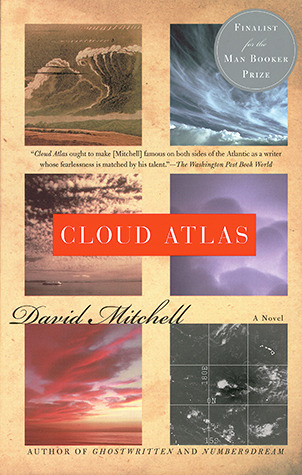Publisher: Random House
 First publication date: August 17th 2004
First publication date: August 17th 2004Pages: 509
ISBN: 0375507256
Synopsis
The narrators hear their echoes in history and change their destinies in ways great and small, in a study of humanity's dangerous will to power. A reluctant voyager crosses the Pacific in 1850. A disinherited composer gatecrashes in between-wars Belgium. A vanity publisher flees gangland creditors. Others are a journalist in Governor Reagan’s California, and genetically-modified dinery server on death-row. Finally, a young Pacific Islander witnesses the nightfall of science and civilization.
Opinion
But I'm not here to talk about the great performances of Tom Hanks or Halle Berry. I'm here to tell you that Cloud Atlas, the book, is a work of art that deserves more love than it gets.
Cloud Atlas is composed of six short stories told by narrators spread across time and space. There is the journal of Adam Ewing, an American notary in 1850, who, while waiting for his ship to be repaired in the Chatham Islands, witnesses a slave being flogged. There are the letters of Robert Frobisher, a bisexual English musician in 1931, who flees to Belgium in the hopes of learning from one of the greatest composers of the time, and becoming one himself. There is the thriller of Luisa Rey, a journalist in 1975 California, who takes it upon herself to investigate the new nuclear power plant that is murmured to be far from safe. There is the self-told comedy of Timothy Cavendish, an old British vanity press publisher in contemporary times, whose life, fortune and freedom come together and fall to pieces after one of his authors kills a reviewer. There is the interview of Somni-451, a clone in a futuristic dystopian Korea, one of the first of her kind to realise she was only a slave to the 'pureblood' society. And there is the story that old man Zachry tells of his youth in a post-apocalyptic Hawaii, when his peaceful village of farmers is raided by the violent Kona tribe.
"But that tells very little of the book!", you may think. True. There is much more to each of these stories, but it's best for you to experience them for yourself.
But let me tell you there is sheer brilliance in the writing. Each story has a different tone, a different sort of writing. It almost feels like each tale is woven by a completely different author. Firstly, there's the change in style: journal, letters, thriller/murder novel, memoir, interview, spoken story; or historical, drama, mystery, comedy, sci-fi, survival.
And then there is the change brought by time. Indeed, between the "earliest" and the "latest" tale, there is a 360 degrees change in language, which evolves from one era to the other. Indeed, we go from "If we believe humanity is a ladder of tribes, a colosseum of confrontation, exploitation & bestiality, such a humanity is surely brought into being, & history's Horroxes, Boerhaaves & Gooses shall prevail" to "Who can say where the cloud's blowed from or who the soul'll be 'morrow? Only Sonmi the east an' the west an' the compass an' the atlas, yay, only the atlas o' clouds."
See what I mean? (Be assured that contemporary language is featured too.) At the beginning, this may make it a bit hard to get into the book, but once you do get into it, it's impossible to let go. Because, with the exception of Zachry's tale, each of the tales is told in halves and when one half ends, all you want to do is to reach the other. So when you have five first halves, the need to get through the book is only greater. It's worse when you end up falling in love with every story in a nearly equal manner and don't want them to end. And even more so when the book makes you search for the hidden links between stories.
In fact, though each story is about 90 pages in length, all of them are connected in subtle and obvious ways, from the discovery of a manuscript of another's life to the belief that one of the characters is a goddess. Nevertheless, there are common themes between them: slavery, corruption, the fight between the powerful and the underdog, truth, freedom, humanity, and above all hope. The hope of a brighter future. The hope that our lives matter. The hope of freedom.
Now, don't take me wrong, this is not a rainbows and flowers story. There is much cruelty, and the good guy does not always win. There is no lack of suffering with no sugarcoating of any sort. Still, I can't imagine stepping out of this novel unchanged. Because you are offered a choice. Will you sit back and let the wheels of power churn, or will you stand and dare to believe in a better world?
The book in a quote
“My life amounts to no more than one drop in a limitless ocean. Yet what is any ocean, but a multitude of drops?”
“My life amounts to no more than one drop in a limitless ocean. Yet what is any ocean, but a multitude of drops?”